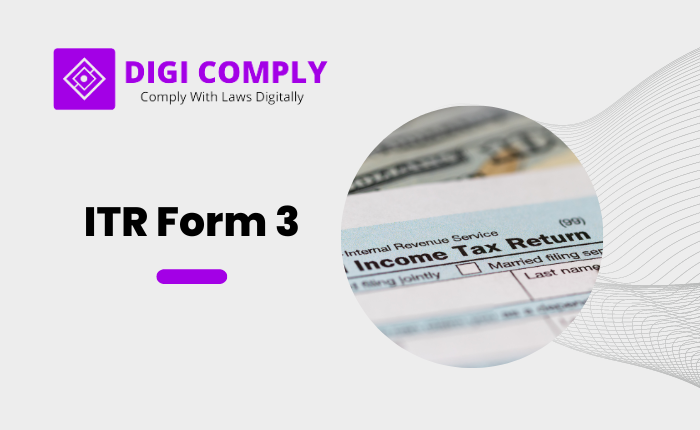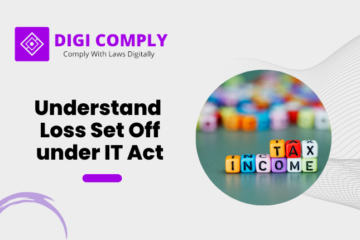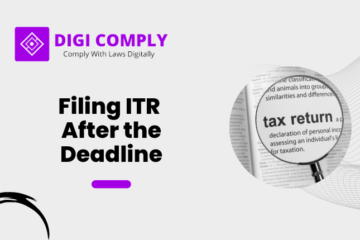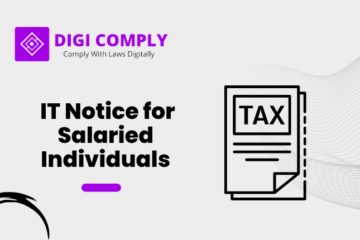Filing income tax returns is an essential obligation for every taxpayer in India. It allows the government to maintain a record of an individual’s financial transactions and ensures transparency in the taxation system. The Income Tax Department of India has introduced different forms to cater to various categories of taxpayers. In this blog, we will explore ITR Form 3, its purpose, and who should use it.
ITR Form 3: An Overview:
ITR Form 3 is one of the forms provided by the Income Tax Department for filing income tax returns in India. This form is applicable to individuals and Hindu Undivided Families (HUFs) who have income from sources other than profits and gains from business or profession. It is not applicable to individuals who are eligible to file ITR Form 1 (Sahaj) or ITR Form 2 (Sugam).
Purpose of ITR Form 3:
ITR Form 3 is designed to capture details of income earned by individuals and HUFs from various sources, excluding business or professional income. It ensures that taxpayers report their income accurately, including income from salary, house property, capital gains, and other sources such as interest, dividends, rental income, etc. By filing ITR- 3, taxpayers fulfill their obligation of disclosing their income to the Income Tax Department.
Who Should Use ITR Form 3?
1. Individuals and HUFs earning income from salary: Salaried individuals who have income from salary and other sources can use ITR Form 3 to file their returns. This form requires them to provide information about their salary income, deductions, and any other income earned during the financial year.
2. Individuals and HUFs with income from house property: Taxpayers who own one or more house properties and earn a rental income should use ITR Form 3. They need to provide details about their properties, rental income, deductions, and interest on home loans if applicable.
3. Individuals and HUFs with capital gains: If you have earned capital gains from the sale of assets such as stocks, real estate, or other investments, you are required to use ITR Form 3. This form allows you to report short-term and long-term capital gains along with the necessary details.
4. Individuals and HUFs with income from other sources: ITR Form 3 is also suitable for taxpayers who earn income from other sources, such as interest, dividends, winnings from lotteries or races, etc. This form enables them to disclose such income accurately.
Key Information Required in ITR Form 3:
When filling out ITR Form 3, taxpayers need to provide the following essential details:
1. Personal information: Name, PAN (Permanent Account Number), address, and contact details.
2. Income details: Information about income from salary, house property, capital gains, and other sources, such as interest, dividends, etc.
3. Deductions: Details of deductions claimed under various sections of the Income Tax Act, such as Section 80C, 80D, etc.
4. Tax computation: Calculation of tax payable or refund due based on income and deductions.
Deductions and Exemptions in ITR Form 3:
When filing income tax returns using ITR Form 3 in India, taxpayers have the opportunity to claim deductions and exemptions to reduce their taxable income. These deductions are provided under various sections of the Income Tax Act, such as Section 80C, 80D, 80G, and others. We will explore the different deductions and exemptions available under ITR Form 3, highlighting their benefits and eligibility criteria.
1. Section 80C:
Section 80C offers taxpayers a wide range of deductions to encourage long-term savings and investment. Some key deductions available under this section include:
– Investments in Public Provident Fund (PPF)
– Employee Provident Fund (EPF) contributions
– Life Insurance Premium payments
– National Savings Certificates (NSC)
– Tax-saving Fixed Deposits (FD)
– Repayment of Home Loan Principal
– Tuition fees for children’s education, etc.
The maximum deduction allowed under Section 80C is ₹1.5 lakh, which can significantly reduce your taxable income.
2. Section 80D:
Section 80D provides deductions for premiums paid towards health insurance policies. The deductions available are as follows:
– Premiums paid for self, spouse, children, and parents’ health insurance policies.
– Additional deductions for premiums paid for health insurance of senior citizen parents.
– Preventive health check-up expenses.
The maximum deduction under Section 80D is ₹25,000 for individuals and their families (₹50,000 for senior citizens) and an additional ₹25,000 (₹50,000 for senior citizens) for premiums paid for parents.
3. Section 80G:
Section 80G allows deductions for donations made to eligible charitable organizations and funds. The deductions under this section include:
– Donations to specified relief funds and charitable institutions.
– Donations for the promotion of scientific research or rural development.
– Contributions to the Prime Minister’s National Relief Fund (PMNRF), etc.
The deduction available under Section 80G can be up to 100% or 50% of the donated amount, depending on the organization or fund.
4. Other Deductions:
Apart from the above, ITR Form 3 also allows taxpayers to claim deductions under various other sections, including:
– Section 80E: Deductions on interest paid on education loans.
– Section 80TTA: Deductions on interest earned from savings accounts.
– Section 24(b): Deductions on home loan interest.
– Section 10(14): Exemptions on house rent allowance (HRA) for salaried individuals, subject to certain conditions.
Conclusion:
Filing income tax returns is a crucial responsibility for taxpayers in India, and selecting the appropriate form is essential for accurate reporting of income. ITR Form 3 serves as a comprehensive option for individuals and HUFs earning income from sources other than business or profession. By using this form, taxpayers can ensure compliance with tax laws and contribute to a transparent tax system in the country. It is always advisable to consult a tax professional or refer to the official guidelines provided by the Income Tax Department to ensure accurate and error-free filing of tax returns.
If You have any queries then connect with us at support@legalsuvidha.com or info@digicomply.in & contact us & stay updated with our latest blogs & articles





